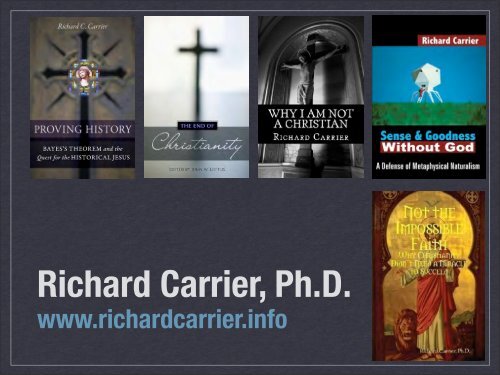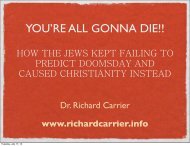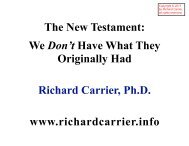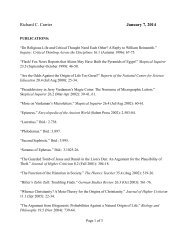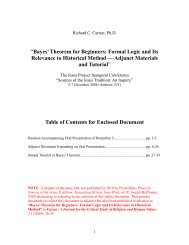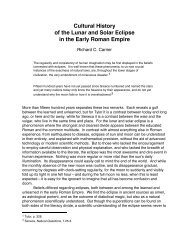PDF slideshow - Richard Carrier
PDF slideshow - Richard Carrier
PDF slideshow - Richard Carrier
You also want an ePaper? Increase the reach of your titles
YUMPU automatically turns print PDFs into web optimized ePapers that Google loves.
<strong>Richard</strong> <strong>Carrier</strong>, Ph.D.<br />
www.richardcarrier.info
LOGIC AND CRITICAL<br />
THOUGHT IN THE 21ST<br />
CENTURY<br />
What’s New and<br />
Why It Matters
BREAKDOWN<br />
Traditional Principles of Critical Thinking<br />
Plus a Dash of Cognitive Science<br />
And a Dollop of Bayesian Reasoning
RESOURCE<br />
www.<strong>Richard</strong><strong>Carrier</strong>.info/<br />
CriticalThinking.html
TO BE A CRITICAL<br />
THINKER...<br />
CT means questioning information rather than merely<br />
receiving it (trust but verify).<br />
CT is a constant skill applied to all domains of knowledge and<br />
belief (not to be compartmentalized).<br />
CT is not an exercise but a tool for belief testing and filtering (it is<br />
your defense against false beliefs).<br />
CT must be applied to yourself as well as others (always selfquestion,<br />
self-test, self-critique).<br />
CT is not radical skepticism (work out when information is<br />
enough to settle a conclusion).
STAGES OF CRITICAL<br />
THOUGHT<br />
Step 1: Check the facts (check multiple sources /<br />
original sources and evaluate their reliability).<br />
Step 2: Check for biases and fallacies (your own and<br />
those of others).<br />
Step 3: Consider alternative explanations of the<br />
evidence and give them a fair test, too.
AND THAT’S WHAT<br />
IT’S ALL ABOUT<br />
Find best defenses of both sides and compare them.<br />
Consider your existing background knowledge and<br />
endeavor to acquire more of it.<br />
Rely on facts and evidence, not assumptions.<br />
Update your beliefs when evidence goes against them.<br />
Restate your beliefs as (rough) probabilities; then<br />
justify those probabilities (or change them if you can't).
IT STARTS WITH<br />
EPISTEMOLOGY
AND ENDS WITH<br />
PROBABILITY
AND ENDS WITH<br />
PROBABILITY
TRADITIONAL CT<br />
Defense Against the Dark Arts: Understanding<br />
argument & persuasion: ChangingMinds.org.<br />
Software Patch 1.0: Understanding fallacies and<br />
how to detect & avoid them: Wikipedia (List of<br />
Fallacies); The Fallacy Files (Taxonomy); Bo<br />
Bennett’s Logically Fallacious.<br />
Logic 101: “Syllogisms” at ChangingMinds.org<br />
(under “Argument”) and Bennett’s book.
IMPROVED CT<br />
Software Patch 2.0: Understanding the cognitive<br />
science of human reasoning, error, and belief-formation.<br />
You need to control, correct, or compensate for your own cognitive<br />
biases, and learn to detect them in others.<br />
Updating Your Firmware: Understanding Bayes’<br />
Theorem and how it underlies all sound thinking.<br />
You need to know how to use Bayes’ Theorem as a tool to improve<br />
your own reasoning and evaluate the reasoning of others.
GETTING WITH<br />
COGNITIVE SCIENCE<br />
It’s the 21st Century: We now know how badly<br />
built our brains are for the purpose of reasoning.<br />
Natural inborn tools of thought and cognition are<br />
clunky, ad hoc, prone to well-documented errors.<br />
You are as much subject to them as anyone else.<br />
Start with Wikipedia’s List of Cognitive Biases.
INSTRUCTION MANUALS<br />
FOR YOUR BRAIN
THE FUTURE OF CT<br />
The Center for Applied Rationality (CFAR)<br />
Rationality.org<br />
LessWrong.com : “refining the art of human<br />
rationality”
EXAMPLES...<br />
Confirmation Bias<br />
Illusory Correlation / Agency Over-detection<br />
Expectation Bias<br />
Availability Heuristic (and other errors in probability)<br />
Backfire Effect<br />
vs. Bandwagon Effect & Persistent Cognitive Dissonance
PERSONALITY-BASED<br />
COGNITIVE ERROR<br />
Dogmatism<br />
Ambiguity Intolerance<br />
Uncertainty Avoidance<br />
Low Openness to Experience
THE “OVERT 5D”<br />
OF PERSONALITY<br />
Openness to Experience [curiosity / exploration]<br />
Conscientiousness [discipline / carefulness]<br />
Extraversion [little effect on cognition]<br />
Agreeableness [compassion / cooperativeness]<br />
Neuroticism [emotionally reactive]
BAYES’ THEOREM<br />
P(h|b) x P(e|h.b)<br />
P(h|e.b) = __________________________________<br />
[P(h|b) x P(e|h.b)]+[P(~h|b) x P(e|~h.b)]
The<br />
Probability<br />
of...<br />
Your Theory<br />
[ H ]<br />
=<br />
How<br />
Typically is<br />
H True?<br />
[<br />
add the<br />
]<br />
above to...<br />
x<br />
How<br />
Typically is<br />
H False?<br />
How Likely<br />
is the<br />
Evidence<br />
on H?<br />
x<br />
How Likely<br />
is the<br />
Evidence<br />
Otherwise?
The<br />
Probability<br />
of...<br />
Your Theory<br />
[ H ]<br />
=<br />
How<br />
Typically is<br />
H True?<br />
[<br />
add the<br />
]<br />
above to...<br />
x<br />
How<br />
Typically is<br />
H False?<br />
How Likely<br />
is the<br />
Evidence<br />
on H?<br />
x<br />
How Likely<br />
is the<br />
Evidence<br />
Otherwise?
BAYES’ THEOREM<br />
Mathematical model of all sound empirical reasoning<br />
...whether you are aware of it or not<br />
...whether you use it or not<br />
But the more aware of it you are / the more you use it<br />
correctly, the more reliable your reasoning will be<br />
Deductively valid formula for inductive logic
BAYESIAN REASONING<br />
freethoughtblogs.com/carrier/archives/80
BAYESIAN REASONING<br />
freethoughtblogs.com/carrier/archives/80
PRIOR Probability<br />
What has usually happened before?<br />
(to cause the kind of evidence we have)<br />
CONSEQUENT Probability<br />
How expected is the evidence we have?<br />
(if our claim is true, and if our claim is false)<br />
AKA “Likelihood”
Unusual Claims Require Unusual Evidence<br />
h ~h<br />
low prior<br />
= high prior
Unusual Claims Require Unusual Evidence<br />
Evidence must<br />
be more likely<br />
on h than...<br />
...it is on ~h<br />
h ~h<br />
low prior<br />
= high prior
What evidence would we normally expect to<br />
have for the claimed fact?<br />
...and for the claimed phenomenon in<br />
general if it existed in general?<br />
Unexpected evidence is improbable evidence<br />
Improbable evidence = evidence against<br />
Evidence that’s improbable on every other<br />
explanation = evidence for what’s claimed
What evidence would we normally expect to<br />
No evidence = Prior probability very low<br />
Some = Prior is relative frequency<br />
have for the claimed fact?<br />
...and for the claimed phenomenon in<br />
general if it existed in general?<br />
Unexpected evidence is improbable evidence<br />
Improbable evidence = evidence against<br />
Evidence that’s improbable on every other<br />
explanation = evidence for what’s claimed
So what evidence is expected if the<br />
claim is false?<br />
Is it the evidence we have?<br />
If not, how unlikely is the evidence<br />
we have if claim is false?<br />
As unlikely as the claimed<br />
phenomenon is generally?<br />
If not, then the claim is<br />
probably false.
PRIORS & LIKELIHOODS<br />
Prior Probability Reflects<br />
all available background experience<br />
all the past findings of science<br />
Likelihood Ratio (Consequent Probabilities)<br />
how expected the evidence we have is<br />
or how unexpected it is
ARGUMENT FROM<br />
SILENCE<br />
Is the absence of certain evidence unexpected?<br />
Unexpected = unusual = infrequent = improbable<br />
That means a low probability of the evidence.<br />
BT entails if that is low, then prior probability must<br />
be high or else h is probably false.<br />
As long as this absence of evidence is expected if h is<br />
false (i.e. high probability of the evidence on ~h).<br />
Prior probability can’t be high if no proven examples.
ARGUMENT FROM<br />
SILENCE<br />
Is the absence of certain evidence unexpected?<br />
Unexpected = unusual = infrequent = improbable<br />
Kooks & Quacks Intuitively Know This<br />
That means a low probability of the evidence.<br />
• That’s why they try to make excuses for why<br />
the expected evidence isn’t observed.<br />
BT entails if that is low, then prior probability must<br />
be high or else h is probably false.<br />
• But BT entails excuses that aren’t proven<br />
actually lower the prior probability.<br />
As long as this absence of evidence is expected if h is<br />
false (i.e. high probability of the evidence on ~h).<br />
Prior probability can’t be high if no proven examples.
IT’S BAYES’ THEOREM<br />
ALL THE WAY DOWN<br />
Not only “Extraordinary Claims Require Extraordinary<br />
Evidence” and the Argument from Silence but also...<br />
The Hypothetico-Deductive Method (HDM)<br />
Inference to the Best Explanation (IBE)<br />
Ockham’s Razor<br />
Etc.
BAYESIAN REASONING<br />
Evidence expected even if h is false is not evidence for h.<br />
The more improbable the evidence is on any other<br />
explanation than h, the more probable it makes h.<br />
The more typically explanations like h turn out to be true,<br />
the more evidence you need against h to conclude it’s false.<br />
The more typically explanations like h turn out to be false,<br />
the more evidence you need for h to conclude it’s true.<br />
“More evidence” always means “evidence that’s more<br />
improbable on any other explanation.”
<strong>Richard</strong> <strong>Carrier</strong>, Ph.D.<br />
www.richardcarrier.info


